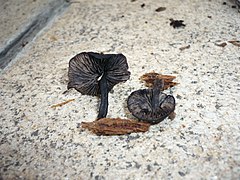Hydropus is a genus of fungi in the family Marasmiaceae. The widespread genus contains about 100 species, especially in tropical areas,[1] but is not well represented in temperate regions. About 15 taxa are found in Europe; H. floccipus has the widest distribution in western Europe.[2] Hydropus was circumscribed by Rolf Singer in 1948.[3] Species in the genus have fruit bodies with caps that are mycenoid, collybioid, or omphaloid in form. Most species occur in tropical and subtropical regions, where they grow as saprobes on rotting wood, forest litter, and mosses.[4] Generally, most Hydropus species are rare, and several are known only from the type collection, including H. conicus, H. moserianus, H. nitens, and H. paradoxus.[2]
| Hydropus | |
|---|---|

| |
| Hydropus atramentosus | |
| Scientific classification | |
| Kingdom: | |
| Division: | |
| Class: | |
| Order: | |
| Family: | |
| Genus: | Hydropus |
| Type species | |
| Hydropus fuliginarius (Batsch) Singer (1943)
| |
Selected species
edit- Hydropus anthidepas
- Hydropus atramentosus
- Hydropus aurarius[5]
- Hydropus conicus
- Hydropus floccipes
- Hydropus funebris
- Hydropus griseolazulinus[6]
- Hydropus kauffmanii[2]
- Hydropus liciosae
- Hydropus marginellus
- Hydropus moserianus
- Hydropus nitens
- Hydropus paradoxus
- Hydropus praedecurrens
- Hydropus serifluus
- Hydropus sphaerosporus
- Hydropus subalpinus
- Hydropus taxodii
- Hydropus trichoderma
See also
editReferences
edit- ^ Kirk PM, Cannon PF, Minter DW, Stalpers JA (2008). Dictionary of the Fungi (10th ed.). Wallingford, UK: CAB International. p. 326. ISBN 978-0-85199-826-8.
- ^ a b c Moreau P-A, Courtecuisse R (2004). "Hydropus kauffmanii, first records from Europe". Mycotaxon. 89: 331–9.
- ^ Singer R. (1948). "New and interesting species of Basidiomycetes. II". Papers of the Michigan Academy of Sciences. 32: 103–50 (see p. 127).
- ^ Bas C, Kuyper Th W, Noordeloos ME, Vellinga EC, eds. (1999). Flora Agaricina Neerlandica. Vol. 4. Rotterdam, Netherlands: A.A.Balkema. pp. 166–7. ISBN 978-90-6191-860-8.
- ^ Takahashi H. (2002). "Two new species and one new combination of Agaricales from Japan". Mycoscience. 43 (5): 397–403. doi:10.1007/s102670200058. S2CID 84428640.
- ^ Pinheiro FGB, Sá MCA, Wartchow F (2013). "Hydropus griseolazulinus, a striking new species from Paraíba, Brazil" (PDF). Mycosphere. 4 (2): 218–25. doi:10.5943/mycosphere/4/2/4.
External links
edit- "Hydropus Kühner ex Singer". Atlas of Living Australia.